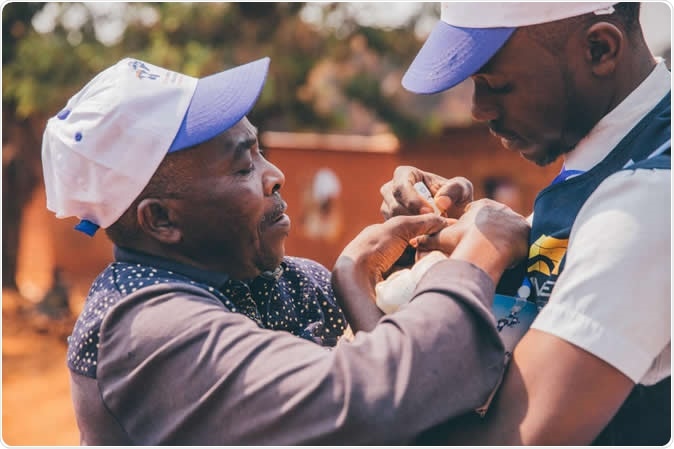There have been no reported cases of polio in Nigeria for the last three years and the nation may soon be declared free of the crippling viral disease. According to the World Health Organization (WHO), Nigeria has come a long way since 2012 when it had almost half of the global number of polio cases.
The head of the primary health care agency, Dr Faisal Shuaib called this a “historic milestone” for the nation. The WHO has said that it may take a few more months before the country could be officially declared free of the disease, but they are almost there. According to chairman of Nigeria's polio committee, Dr Tunji Funsho, the WHO would need strong surveillance data to be certain that there are no cases infected with wild polio virus for three consecutive years before they can declare Nigeria polio-free.

Africa today heads into the last mile to be free of wild polio. Image Credit: WHO
Nigeria is the last of the African nations to soon achieve the polio free status. The other nations in Africa have been declared free of the infection thanks to the general public awareness and mass vaccination campaigns. Polio or poliomyelitis is a viral disease that may lead to weakness and paralysis or deformity of the limbs – usually legs, and leave a child crippled for life. One in 200 children affected with the virus may develop paralysis. Of these 5 to 10 percent may succumb to the infection because it affects their breathing muscles leading to paralysis. There is no cure for this disease or infection but an effective oral vaccine is available for children under the age of five years to protect them from the infection.
The last recorded case of polio in Africa was recorded from the north-east Borno state in Nigeria three years back. In the rest of Africa the last case was recorded from Puntland region of Somalia, in 2014. Nigeria lagged behind other nations at its borders due to the inability of the vaccination campaigns to penetrate the war torn areas of that region. The Boko Haram militant group in the area was a major hindrance to the vaccination drives. Since then there has been influx of financial support and the drive for vaccinating as many children as possible on a routine basis received fresh impetus. Dr. Oyewale Tomori, a professor of virology at Redeemer's University in Nigeria, referring to the Boko Haram hit areas, said, “Until we can confidently say we have reached all the children in these areas were a case was found in 2016, that is when we can celebrate.” Dr. Pascal Mkanda, head of the polio eradication effort in WHO's regional office for Africa said in a statement, “To detect a case of wild polio, we need to go to communities to see children who have symptoms and take samples but there are certain areas that there is insecurity and this poses a challenge of accessibility.” He added that they are using mobile technology to reach the remote areas.
According to WHO Africa head Dr Matshidiso Moeti, Africa is on the way to eliminating this dreaded disease. She added that Africa is, “on the verge of an extraordinary public health achievement; one which will be our legacy to our children and children's children.” “It has involved men and women volunteering in the thousands, sometimes putting themselves in harm's way,” Moeti said. She added, “We are confident that very soon we will be back here trumpeting the certification that countries have, once and for all, kicked polio out of Africa.”
That said, the WHO experts have warned that efforts to continue vaccinations must remain unchanged. All regions must be free of polio cases and no case should be missed. WHO head of polio eradication Michel Zaffran added that, “to end polio, at least 95% of children must be vaccinated, no matter where they live.” Polio has been designated by the WHO as a “Public Health Emergency of International Concern,” in November 2018 due to its potential for spreading across nations.
Across the globe polio has been all but eliminated due to the effectiveness of the vaccine campaigns. The WHO says that in 2018 there were a total of 33 cases of polio and all of them were from just two nations – Pakistan and Afghanistan. The reason behind the delay in polio elimination is due to inadequate vaccine coverage says the WHO. A WHO statement reads, “Suboptimal routine immunization coverage remains a critical challenge in some countries. As a result, outbreaks of circulating vaccine-derived poliovirus -- a rare occurrence in communities with low levels of population immunity -- are still possible in several countries across Africa.” The global vaccination drive is supported by the Global Polio Eradication Initiative wherein there is collaboration between WHO, UNICEF, the US Centers for Disease Control and Prevention (CDC), Rotary International and the Bill & Melinda Gates Foundation.